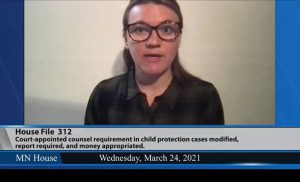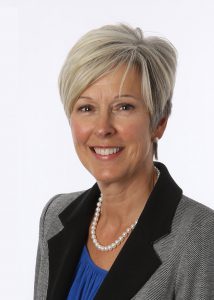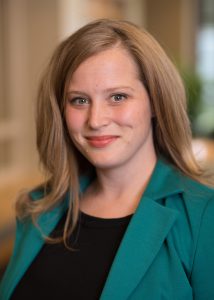
Joanna Woolman (right), from Mitchell Hamline’s Institute to Transform Child Protection, speaks with Minnesota Gov. Tim Walz at an event on Oct. 18, 2021, to celebrate several measures that passed this year aimed at helping children and families.
After years of work, Mitchell Hamline’s Institute to Transform Child Protection was part of an event in October with Governor Tim Walz and Lt. Governor Peggy Flanagan to celebrate several legislative wins for Minnesota families. The institute had worked specifically on two proposals that became law.
The measures were part of a larger bill that funded Health and Human Services initiatives across the state. One mandates lawyers be appointed in child welfare cases for parents who can’t afford one. The other removes critical barriers that had been keeping family members from serving as foster parents in cases where courts removed children from their parents’ care.
“These two measures are critical to keeping more families together,” said Joanna Woolman, executive director of the Institute to Transform Child Protection.
“We’ve been working on the parent representation bill for more than 10 years and the foster care licensing bill for four years. More than 10 Mitchell Hamline students were involved in these efforts over the past decade.”
Through a policy-focused clinic the institute offers, students work with Mitchell Hamline faculty and clinic leaders to help achieve the institute’s legislative priorities. Student work includes researching, drafting language for possible legislation, and even testifying before lawmakers.
RIGHT TO COUNSEL

Mitchell Hamline student Adrienne Baker, testifying before Minnesota lawmakers in an online hearing on March 24, 2021.
Earlier this spring, during her final semester of law school, Adrienne Baker testified before a legislative committee for the right-to-counsel legislation. “I learned so much working with different committees to better understand the intricacies of both law and policy,” noted Baker, who has since graduated and is currently clerking for two Minnesota Supreme Court justices. “The clinic ultimately showed me there are many ways I can use my law degree to be an advocate, and I’m very grateful for the experience.”
Former Minnesota Supreme Court Justice Helen Meyer ’83 has worked with the institute for more than a decade to get the parent representation bill passed. In 2008, a change from a state-run to a county-run system left many parents without attorneys at their initial hearings and throughout their cases. Meyer led a committee to explore how to improve Minnesota’s system for providing attorneys to parents in child welfare cases. Minnesota was one of just seven states without such a guarantee. More than 6,000 children were removed from their parents’ care for at least one day in 2020, according to the institute.

Former Minnesota Supreme Court Justice Helen Meyer ’83
“The Child Protection Program at William Mitchell (now the Institute to Transform Child Protection at Mitchell Hamline) was established, in part, to develop data and urge policy change on this issue,” said Meyer. “The bottom line is that this change in the law will help children spend less time in foster care, with long-term stability being realized.”
State Representative Jamie Becker-Finn ’11 sponsored the bill, telling the Minnesota Reformer this summer it was one of the most challenging deals she’s ever worked on. There was agreement around the benefits of guaranteeing legal representation, she told the publication, but it took a lot of work to find a way to fund it.
“I’m really, really pleased that we were able to get this done this year,” she told the Reformer. “The sooner we can get this into place, the sooner we can help families.”
FOSTER CARE LICENSING

Natalie Netzel ’15, education and advocacy director for Mitchell Hamline’s Institute to Transform Child Protection
The institute hadn’t been working on the second proposal that passed for as long, but it was no less important, added Woolman. “Minnesota had a lot of unnecessary criminal barriers in our foster care licensing statutes that kept relatives from being able to become foster parents to children where parental rights were terminated,” she said.
“I think this change will have a huge impact and be important for our BIPOC communities.”
The new law removes several low-level and nonviolent offenses from the list of crimes that would disqualify a person from becoming a foster parent, which requires a license in Minnesota.
Natalie Netzel ’15, the institute’s education and advocacy director, told the Reformer the changes will “make it significantly easier for kids to be placed with family members, if they need to be removed from their parents.”
